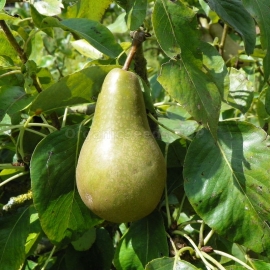





Organic Wild Pear Seeds (Pyrus communis)
3.00 €
Tree up to 20 m high, sometimes a large shrub, prickly shoots, pear-shaped or rounded fruits, ripe in August - September.
-
Common pear or wild pear / Pyrus communis
One of the species of the genus Pear, distributed in the territory from Eastern Europe to Western Asia. Tree up to 20 m tall, sometimes large shrub. Shoots thorny Leaves oblong-round, shortly pointed, leathery, on long petioles, turning black when dry.
Flowers are 6-12 in corymb-like inflorescences, formed from fruit buds formed the previous year. Perianth is double, pentamerous. Corolla up to 3.5 cm in diameter, snow-white, sometimes pinkish. Stamens are numerous, having a violet-pink coloration. The nectar-bearing tissue is located on the open peduncle. Both wild and cultivated forms bloom abundantly, beginning with the appearance of leaves, in May, somewhat earlier than apple trees. Trees in plantations blossom for 14-16 days, individual flowers for up to 5 days.
Fruits are pear-shaped or rounded, ripening in August-September.
Fresh pears, taken in small quantities, regulate digestion and are perfectly digested by the human body.
Dried fruits have long been used in folk medicine. Decoction of dried pears quenches thirst at feverish illnesses, has analgesic, antiseptic and diuretic effect, fixing at diarrhea. Boiled and baked pears are used for severe coughs, choking and pulmonary tuberculosis.
Pears are of great importance in dietary nutrition, especially for diabetics.
Pear flowers provide bees with very valuable spring nectar and pollen, but pear is inferior to cherry, plum and apple in honey yield. Honey productivity of pear is about 20 kg of honey from 1 hectare of plantation. The nectar harvested by bees from the pear is low in sugar.
